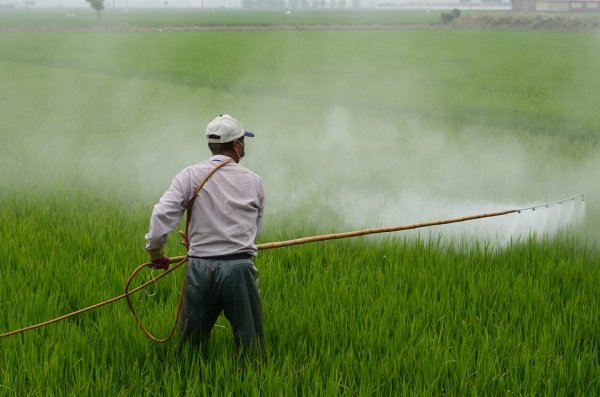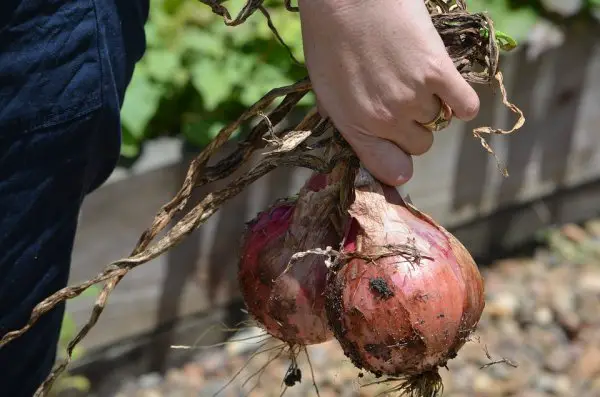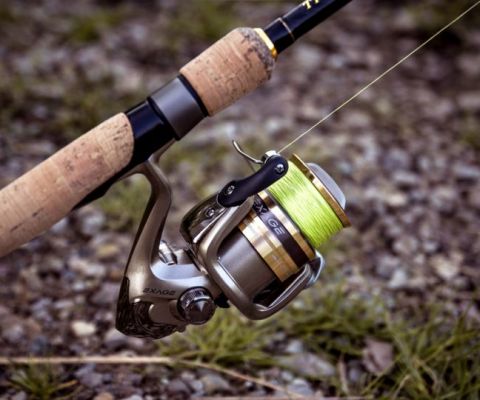Is Roundup Safe? The Important Facts You Need to Know
 Is Roundup Safe? The Important Facts You Need to Know
thegearhunt.com
Is Roundup Safe? The Important Facts You Need to Know
thegearhunt.com
If you aren’t a farmer, don’t have your own garden, or don’t spend a ton of time killing weeds, then you might have never even heard of Roundup. However, there is a controversy raging as to what this product does to people’s health and whether it’s something that should be taken off the shelves or not. For those of you that don’t know, roundup is a herbicide used to kill weeds in everything from gardens to landscapes. It comes in quite a few compositions, including Roundup Weed, Grass Killer Ready-to-Use Plus, and it also comes in Roundup Weed and Grass Killer Super Concentrate formula as well. While it is stated clearly on the label, that Roundup should be completely dry, before allowing people, children, or pets into the area, there are some studies that show, the herbicide is dangerous no matter what.
 The thing is that one of the primary ingredients in Roundup, Glyphosate has been discovered to actually be a probable carcinogen that, of course, can lead to cancer. The keyword too many people in that sentence is probable, meaning that it’s not a known fact that roundup contains a carcinogen that causes cancer, although it was the International Agency of Research on Cancer that released the statement.
The thing is that one of the primary ingredients in Roundup, Glyphosate has been discovered to actually be a probable carcinogen that, of course, can lead to cancer. The keyword too many people in that sentence is probable, meaning that it’s not a known fact that roundup contains a carcinogen that causes cancer, although it was the International Agency of Research on Cancer that released the statement.
Whether Roundup is safe or not safe, remains to be discovered and in the meantime, it is still on the shelves and can be purchased to at will. However, if you are considering using roundup to kill the weeds in your garden or yard, you will want to know all of the facts. That is where this blog comes in. We are going to look at the pros, cons, facts, and even how to try to protect yourself when using this herbicide to hopefully help you make an informed decision. As a side note, it is important to remember that everything we go into here doesn’t mean that Roundup is safe or not safe, these are just the facts as we found them, during our research. Ready to delve into the world of the Roundup controversy. Okay, then, let’s get started.
A Brief History of Glyphosate
Glyphosate was discovered first in the early 1970s. Since that time, it has become the most widely used and extremely popular herbicide, not only in America but in the entire world as well. However, as previously stated, recent studies show that the Glyphosate in Roundup could cause side effects and health issues, so make your decision carefully.
The Advantages of Using Roundup Revealed
First, we feel that it’s important to go into the advantages and disadvantages of Roundup, which includes the ingredient Glyphosate. Read on below for the advantages of using this herbicide.
Very Low Rate of Persistence
With many other herbicides, it takes years for them to dissipate, meaning they will continue to kill plants, weeds, and other things in your yard for many years to come. One of the biggest advantages of Roundup is that it gets absorbed fast by the dirt particles in your yard, which means it breaks down quickly into substances that are natural and non-toxic. One study showed that after 40 days of being in the ground over half of the Roundup used on a garden had dissipated and was already non-toxic.

Has Low Toxin Levels
Roundup is said to have lower toxin levels than many other herbicides on the market today. When used correctly and per the instructions, Glyphosate in Roundup don’t even runoff into lakes and streams causing them to be exposed to chemicals and poisons. It is said that this is the herbicide with the least amount of toxins, and the one that is the safest to use in your garden to prevent health issues from occurring for you and your family.
Is Very Effective at Controlling Weeds
Each and every year, farmers and gardeners alike lose over billions of dollars in crops to weeds that take over their gardens. For some of these people, those crops are their livelihood and how they put food on the table for their families. Roundup usually kills those weeds within two to 10 days, making the yield of the crop higher. There have even been crops, such as corn, have been modified so that the Roundup doesn’t affect them, meaning it kills the weeds and leaves the crops alone.
The Disadvantages of Roundup Revealed
Now, that we have talked about the advantages of using Roundup in your garden or on your farm, it’s time to get into the disadvantages of this herbicide. Read on below for the list of disadvantages to be revealed.
Carries Health Risks for Humans
The biggest and most disturbing disadvantage of using Roundup is that it carries severe health risks for humans. If the product is ingested, comes in contact with your skin, or you breathe it in, it can lead to symptoms that will land you at the emergency room. Contact with Roundup can cause diarrhea, vomiting, skin irritations, and nausea. If this happens to you, please get help right away from a doctor or other trained medical professional.
Can React with Metals
It’s important to note that Roundup should never be mixed or stored in any type of metal or steel container or tank unless you are 100 percent positive it is stainless steel. The two chemicals react to one another and the container becomes highly combustible with gas, making it extremely dangerous. The only type of containers safe to use with Roundup or plastic or fiberglass. If you are unsure if the container you’re using is stainless steel, err on the side of caution and use something else.
Kills Non-Selectively
Roundup is systematic and doesn’t just select which weeds to kill in your garden. Instead, it kills every piece of vegetation in sight, so if you aren’t careful you could end up killing the very vegetation you were trying to protect with the Roundup, you were trying to protect it with. There are certain types of vegetation that have been bred to withstand the herbicide, but you really need to be careful when putting it out, if you don’t want to kill vegetation you want to keep.
Weeds can Build Up a Resistance
Some weeds can actually build up a resistance to the Roundup, meaning that the herbicide won’t kill them. If you feel Roundup is no longer working in your garden or yard, there is a number you can call online for help.
Effects the Water
Since some homeowners or farmers use Roundup directly on weeds in ponds and lakes or even around them, it has been discovered that the herbicide affects the water habitats, and the aquatic life that lives there.
This brings us to the end of our pros and cons section of this blog on what you need to know about the herbicide known as Roundup. Please, take every item into consideration when deciding whether to use this herbicide on your yard, garden, or around your farm.
What Should You Wear When Using Roundup?
If you have weighed the pros and cons and are sure you want to use Roundup on your garden or farm, then you should know what to wear during that time. Some experts say that the Roundup is only slightly toxic when used the right way and if you wear the proper gear. With that being said, read on below for what to wear when putting out Roundup.

To Protect Your Eyes
It’s best to wear goggles to protect your eyes when spraying Roundup anywhere in your yard or garden. You also want to ensure that you have side eye protection as well. If you accidentally get the herbicide in your eyes, wash them with cool water and seek medical attention right away.
To Protect Your Skin
It’s best to protect your skin by wearing socks, long pants, closed toe shoes, and long-sleeved shirts. It’s also a good idea to wear thick, heavy gloves to keep the herbicide from coming in contact with your skin. It causes skin irritation and has been linked to cancer, so please be careful with use.
To Protect Your Respiratory System
It is also a good idea to use a mask or some type of respirator when using Roundup anywhere on your property. It’s not ironclad, but there is proof that this product has carcinogens in it that can damage your lungs.
Now, that we know the gear you need to wear, let’s talk about how to use Roundup in your garden, on your farm, or in your yard, when the time comes.
How to Safely Use Roundup
Read on below for how to use roundup.
Put on Safety Gear
The very first thing you should do when using this herbicide is put on the safety gear that we talked about in the section above this one. There is not one step of this part of the process you should skip. Make sure that you keep pets and children away while you are spraying and for a few hours afterward as well.
Protect Surrounding Vegetation and Plants
As previously stated, Roundup will kill any plants and vegetation in the area, not just weeds. Any plants and vegetation you wish to keep should be covered well by cardboard barriers, plastic sheets, or tarps of some kind.
Once Done, Dilute and Spray
Once you have donned your safety gear, gotten all animals and children, out of the area and covered any plants and vegetation you choose to keep, you are then ready to dilute the Roundup and spray the area. It is extremely important to dilute the herbicide with water and never use it full strength. Follow the instructions on the container to a tee to ensure you are mixing it properly. Once sprayed, it should take about six hours to see results from the spray.
A Few of the Health Problems that have been Linked to Roundup
We would be remiss if we didn’t list a few of the health problems that have been linked to Roundup in the past. They are listed below for your perusal.
ADHD
Studies have shown that in many farming communities, there is a strong possibility that the use of Roundup has caused ADHD in children, and it seems to be more prevalent in these communities. It is said that it is possibly linked to the Glyphosates ability to interfere with the functions of the thyroid.
Birth Defects
It is also said that Glyphosates and Roundup have been known to disrupt any vitamin A signaling pathways in the blood, which can lead to severe birth defects in babies. It is estimated that women who live close to fields that are being sprayed are more likely to have children born with severe birth defects.
Brain Cancer
Roundup has also been linked to brain cancer in children. Studies showed that one either parent had been exposed to Roundup, it was more likely that their children would develop brain cancer in the future.
Below you can find a list of the possible health-related issues that have been rumored to be caused by using Roundup.
- Alzheimer’s Disease

- Ancacheply
- Autism
- Breast Cancer
- Cancer
- Gluten intolerance
- Celiac disease
- Kidney disease
- Depression
- Diabetes
- Hypothyroidism
- Inflammatory Bowel Disease
- M.S.
- Parkinson’s disease
- Miscarriages and other pregnancy related issues
- Obesity
- Reproductive problems, men and women
- Respiratory illnesses
These are just a few of the conditions that have been linked to Roundup and its ingredients. While there is no concrete proof that these are caused by Roundup, it bears thinking about carefully, before you decide to use it on your farm, in your yard, or around your family.
Remember, these are just the facts that we have gathered about Roundup. You should do your own research to determine if it’s the best thing for you to use, however. Be careful and be safe either way!
Sources
- SFGate: What Are the Pros and Cons of Glyphosate?
- ECO Watch: 15 Health Problems Linked to Roundup
- SFGate: What to Wear When Using Roundup















